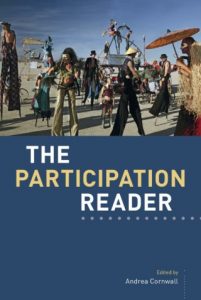The Participation Reader
Edited by Andrea Cornwall
Book Review
 My great appreciation goes to Andrea Cornwall for undertaking the task of bringing together in one volume this collection of significant writing on participation. It spans the time-frame of 1969–2007; the range of definitions and typologies, methodologies, community projects and programmes, policy and governance, and collective action; and the perspectives of academics, development theorists, and practitioners and activists from around the world. No wonder this collection of writing on participation was a long time in the making.
My great appreciation goes to Andrea Cornwall for undertaking the task of bringing together in one volume this collection of significant writing on participation. It spans the time-frame of 1969–2007; the range of definitions and typologies, methodologies, community projects and programmes, policy and governance, and collective action; and the perspectives of academics, development theorists, and practitioners and activists from around the world. No wonder this collection of writing on participation was a long time in the making.
The volume opens with the classic ‘ladder of citizen participation’. Sherry Arnstein’s ground-breaking contribution stands the test of time well, despite the inevitable limitations its era imposed. I can report that, among the range of frameworks, models, and concepts I use in my work, this one is most consistently appreciated by civil society organisations as useful in helping them think constructively about what they are trying to achieve.
This collection delivers a mix of enthusiastic advocacy for and critique of participation which together provide an overview of ideas, debates, and practice that have made participation such a lively topic across the decades. It quickly becomes clear that participation is many things, and in itself might be considered gender-neutral: it all depends how it is used, for whose benefit, and to what purpose. It is also clear from the beginning that most of the literature on the topic does not even touch on issues of gender. It is left to the individual practitioner or academic to apply (or not) gender analysis to the use of the ideas. Is that a weakness or a strength? On the one hand, it leaves people vulnerable to their own positionality, as shown in the largely ‘androcentric bias’ (Patricia McGuire, p. 96) of much application of participatory action research; and it is no protection against capture of participation by elites of various kinds, particularly as the discourse of participation can be fitted comfortably into neo-liberal perspectives just as easily as into more radical and emancipatory approaches. But on the other hand, this means that when there is clear purpose and clear gender analysis, participation can be harnessed to the delivery of powerful change processes, inspiring examples of which can be found in this collection. It also allows great flexibility in adapting approaches and methods to the complexity of addressing gender in ways that also address intersections with the diversity of women’s and men’s other identities.
Digging into the participation literature means digging into power relations, in families, in communities, in a wide range of institutions. Participation goes far beyond processes and the methodologies of ‘Participatory (Rural) Appraisal’ (PRA). The collection takes us into deeply embedded ideas and beliefs, through individualistic problem-solving and community-level change. It opens doors to analysis and activism around both the individual or a community’s interaction and relationship with the state, bringing us to the debates around democratic governance and citizenship. We see how participation can be both naive and sophisticated, co-opting and emancipatory.
One thing participation provides is an entry point to re-invention. One area of re-invention that comes through strongly in this collection is in the field of accountability. Not so much accountability of elected office-holders through elections; rather, accountability of the myriad unelected power holders – bureaucrats and appointees – that make up most institutions that shape people’s lives. Active citizenship in the shape of oversight by a range of civil society groups of planning, and reporting of institutional activity and outcomes, whether welcomed or not by the institution concerned, is increasingly important in ensuring that the needs of the majority of the population are addressed and that resources reach those who need them. Participation by civil society groups in these processes does not have to respond to an invitation, but can arise out of a self-initiated determination to address corruption and self-serving decision-making.
It is not participation itself that provides transformation in power relations, including gender relations. But anyone wanting to take a fresh look at how their own analysis and practice might contribute to shifting power relations and gendered inequalities could benefit from using this volume as a trigger for reflection and source of insight that will caution as well as inspire.
Review © 2012, Jo Rowlands, Senior Global Programme Adviser(Governance & Institutional Accountability), Oxfam GB, UK.
The Participation Reader is published by Zed Books.
Review originally published in Gender & Development 20 (2012).
